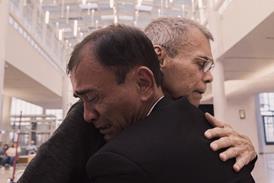LFS director Ben Gibson talks about the school’s future as a film hub, why internationalism is important, and the breadth of the new MA in Film Curating.
The London Film School describes itself as the oldest-established international school of film technique in the world, founded in 1956. About 30% of its students are from the UK, and they study multiple disciplines (not just directing) as part of the Filmmaking MA (a screenwriting MA is also offered). Students work on a minimum of six films.
Alumni include Mike Leigh, Moon director Duncan Jones, and recent success stories include Rotterdam Tiger winnersPedro González-Rubio and Paz Fabrega as well as DoPs The Arbor (Ole Bratt Birkeland), Submarine (Erik Wilson) and The Disappearance Of Alice Creed (Philipp Blaubach).
Innovations at LFS including the launch of the world’s first MA in Film Curating this year; The Fast Forward programme to bring together film students to collaborate with working professionals; the Hothouse development scheme for professional filmmakers incubating their ‘signature’ first features; and a series of low-budget filmmaking forums with other European schools (the next one will be held at Les Arcs this month).
Screen spoke to LFS Director Ben Gibson, a former producer and head of production at the BFI (from 1989-1997)and also a partner at The Other Cinema/Metro Pictures in addition to having worked as a theatre director, a repertory film programmer and writer.
The London Film School has its Annual Show tomorrow at the National Gallery (by invitation only).
With the school’s lease in the Covent Garden building running out in several years, you have the idea to fundraise to create the LFS Centre.
We’ve always had people like Hitchcock and Fritz Lang coming to the school to talk to the students, it’s always been about that.
I have a suspicion of film schools that exist as a middle-class exclusive thing. What I’m interested in, is every evening at 6:00 the doors flying open and the wind of reality blowing through film school. So it is a safe place to explore and to fail, but it’s not the cradle-to-grave protection racket for people who get into film school.
With Hothouse and our evening events, our workshops and the Fast Forward programmes, all of that are about bringing in working freelancers into the context of working cheek by jowl with students who are already in the programmes.
If we had this LFS Centre, we could be a repertory cinema, we could invite filmmakers to be in residence and we can get industry organisations throughout the value chain involved — and we could have a research capacity. It’s not just dealing with production. The school is a general service to the whole sector.
Inaddition to having a new home, how else do you see the film changing over the next decade?
What will have happened in 10 years is that the international presence of the school will be different, and much more intense. I’m not in favour of us franchising out into the Middle East or somewhere like that, although we’ve been invited to, because in a way what we’re going to try to do is create partnerships with cultural organisations to do continuous professional development, and do scholarships in other territories. It’s about the film school having a cultural presence in other cities, and us creating a process to get a few of those people to get into the school.
Do you think the makeup of the school will change, are you happy that it’s 30% British and 70% international students?
That mix is good. The problem with British film is that it is an isolated and parochial industry. And I think that people’s ideas can be radically changed with all this contact with people from other territories.
What are the areas of concentration in the new Curating MA?
They are from all over the world and mostly they have done bits of curating. They’ve worked in arts administration and they want to qualify as programmers or film writers or whatever. In a way its more of an academic degree than we normally do. It takes in distribution, sales, intellectual property, all of those issues so that you should be able to come out of it to work in a distribution company just as much as programming a festival or TV strand.





















1 Readers' comment